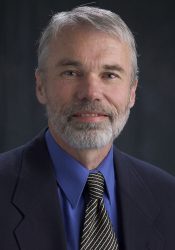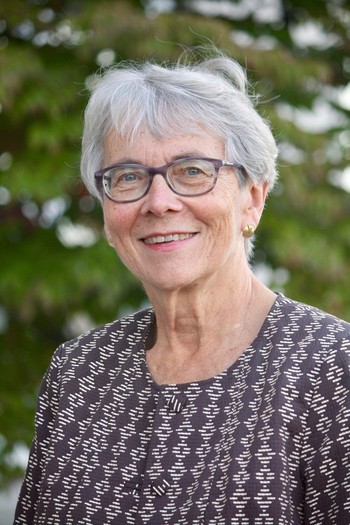Professor Emertius Michael Bratton grows fellowship to support work in Africa
November 24, 2020 - Karessa E. Weir
University Distinguished Professor Emeritus Michael Bratton has increased his support to the MSU Department of Political Science with a $10,000 contribution to the Bratton Fellowship, which supports graduate students for doctoral fieldwork in Africa.

 The Bratton Fellowship was created by Dr. Bratton and Anne Schneller, former Co-Director of the Borlaug Higher Education for Agricultural Research and Development Program in the Department of Agriculture, Food and Resource Economics. The couple devoted their careers to conducting research in Africa and supporting students from MSU.
The Bratton Fellowship was created by Dr. Bratton and Anne Schneller, former Co-Director of the Borlaug Higher Education for Agricultural Research and Development Program in the Department of Agriculture, Food and Resource Economics. The couple devoted their careers to conducting research in Africa and supporting students from MSU.
"The Fellowship is intended to encourage students who have demonstrated the capacity to achieve educational and professional goals in the field of comparative and African politics, the motivation to acheive these goals and the initiative to seek opportunities to further their progress," wrote Bratton and Schneller.
The fellowship is open to MSU Political Science PhD candidates working on African Politics, and provides for field research in one or more African countries during a Summer Semester. Recent award winners include Steve Anderson, Lizzie Brannon and Chrissy Scheller.
Dr. Bratton was honored by a conference in his name in 2018 "From Power Politics to Popular Power." Organizers Drs. Jeffrey Conroy-Krutz and Carolyn Logan described Dr. Bratton's legacy:
Mike is, without question, one of the most prolific, widely cited, and broadly influential scholars of African politics in the last fifty years. He has published seven books, including five original works and two edited volumes, and over three-dozen articles in peer-reviewed and other journals.
He is probably best known for his ground-breaking treatment of regime change (with Nicolas van de Walle), Democratic Experiments in Africa (Cambridge University Press, 1997). By Google Scholar’s count, the book has been cited some 3200 times, making it the third most widely cited academic book on African politics. The book inserted African cases into discussions that had previously been focused on Latin America and Europe, made the character of ancien regimes a central component of transition stories, and highlighted how the neoliberal economic turn in Africa had broader political consequences.
Three themes have appeared more frequently than others in Mike’s work. First, drawing on public opinion data from the Afrobarometer, Mike has done more than any other scholar to tell us what Africans think about democracy, their regimes and governments, and their priorities for the future. These contributions have been published in a range of articles, in the American Journal of Politics Science (2007), Electoral Studies (2006), Journal of Democracy (2008, 2010), African Affairs (1994), British Journal of Political Science (2001), and World Development (2003, 2012). His 2005 book, Public Opinion, Democracy, and Market Reform in Africa (Cambridge University Press, with Robert Mattes and E. Gyimah-Boadi), is a series of ambitious and wide-ranging analyses on what Africans think about politics, why they think it, and what (if anything) they do about it. The scope of the book has made it a bible of sorts for those studying Africans’ opinions on economic and political issues.
Second, much of Mike’s earliest work focused on the political economy of development. These works touched upon agricultural policy, economic reform, and the role of non-government organizations in policy formulation and implementation. His first two books—Beyond Community Development (Catholic Institute of International Relations, 1978) and The Local Politics of Rural Development (University Press of New England, 1980), and a range of articles—in the Journal of Modern African Studies (1981, 2001), Public Administration (1986), and Development and Change (1990)—addressed these topics.
Finally, Mike has long been one of the most trenchant observers of the politics of Zimbabwe. His latest book—Power Politics in Zimbabwe (Lynne Rienner, 2015), which was selected as a Choice Outstanding Academic Book—assesses the challenges that country faces with regard to democratic development: issues that are even more pressing now that Robert Mugabe has left the scene. He has also written on electoral violence (Journal of Modern African Studies, 2011), Operation Murambatsvina (African Affairs, 2007), propaganda (Journal of Contemporary African Studies, 2005), and the conduct of elections (Electoral Studies (2016) and the Journal of Democracy (2008)).
Outside of these main themes, Mike has published on informal institutions (Journal of Democracy, 2001), civil society (World Politics, 1989), Islam (African Affairs, 2003), state-building (Comparative Political Studies, 2006), vote buying (Electoral Studies, 2008), participation (Comparative Political Studies, 1999), and civic education (World Development, 1999). The cases on which he has written span the continent, from Ghana and Mali in the west, to Kenya and Uganda in the east, to Lesotho, Zambia, and Zimbabwe in the south.
Mike’s role as a co-founder of Afrobarometer, a public opinion research project that has worked in 37 African countries, and which has become a touchstone for analysis of politics across Africa, is well known. Since its inception in 1999, Afrobarometer has conducted more than 170 surveys, capturing more than 250,000 individual interviews. The project has resulted in more than 180 working papers, most of which Mike has reviewed as editor of the Afrobarometer’s series, as well as hundreds of dispatches, briefings, policy papers, and other documents.
One of Afrobarometer’s particular strengths is the highly collaborative nature of its work—the network’s success is a collective achievement. However, together with co-founders Robert Mattes and E. Gyimah-Boadi, Mike has been a driving force in developing and sustaining the project’s core values, including the commitment to quality, transparency, and capacity building among African partners.
This last value has been particularly meaningful, in that collecting data has never been Afrobarometer’s sole focus. Rather, building capacity on the continent to collect and analyze data has been one of the project’s core objectives. Mike has been dedicated to planning and conducting capacity-building workshops for partners that have strengthened research skills across the continent. These investments have expanded opportunities for the network’s many collaborators, and Afrobarometer national partners are often considered “go-to” partners for high-quality research. Mike has also been a core participant in the network’s signature “Afrobarometer summer schools,” aimed at building analytical capacity among partners, university students, and NGO staff from across the continent. Tellingly, the vast majority of Afrobarometer dispatches (more than 200 published) and policy papers (45 published) are authored or co-authored by Africans, and an increasing number of masters theses and dissertations in Africa utilize Afrobarometer data.
Because of these shared commitments, Afrobarometer has developed into a pan-African network that is African-led and African-owned. While Michigan State University initially carried much of the network’s management burden, in 2008, Mike handed over the executive directorship to Dr. Gyimah-Boadi, and most management functions have been transferred to the Center for Democratic Development in Ghana.
Mike’s commitment to mentoring and advancing the work of others has been evident in other ways. Most notably, it is nothing short of astonishing that someone who has produced so much of his own research has also found the time and commitment to comment—quickly and constructively—on literally hundreds of papers, dissertations, and manuscripts written by others, including junior colleagues and graduate students, as well as Afrobarometer partners and staff..
His list of accomplishments could go on to include Mike’s contribution to policy debates in Washington (where he is frequently being invited for presentations at the State Department, on the Hill, and by NGOs and other policy institutes), and his role in establishing the Global Barometers network of researchers.
In sum, few have done more to bring African politics into the mainstream of the global study of political science, both through his own work, and through mentoring and advancing the work of others. Mike has changed the way we understand and study African politics, while helping so many to become better researchers, analysts, and authors. His example will continue to push each of us to become better (and more productive!) citizens of the Africanist community."

